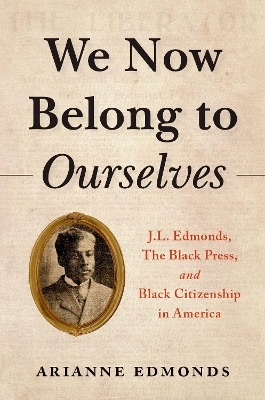
We Now Belong to Ourselves
Oxford University Press Inc (Verlag)
978-0-19-757908-4 (ISBN)
- Noch nicht erschienen (ca. Juni 2025)
- Portofrei ab CHF 40
- Auch auf Rechnung
- Artikel merken
At the turn of the twentieth century, the Black press provided a blueprint to help Black Americans transition from slavery and find opportunities to advance and define African American citizenship. Among the vanguard of the Black press was Jefferson Lewis Edmonds, founder and editor of The Liberator newspaper. His Los Angeles-based newspaper championed for women's rights, land and business ownership, education, and civic engagement, while condemning lynchings and other violent acts against African Americans. It encouraged readers to move westward and build new communities, and it printed stories about weddings and graduations as a testament to the lives and moments not chronicled in the White-owned press.
Edmonds took this fierce perspective in his journalist career for he himself was born into slavery and dedicated his life to creating pathways of liberation for those who came after him. Across the pages of his newspaper, Edmonds painted a different perspective on Black life in America and championed for his community--from highlighting the important work of his contemporaries, including Booker T. Washington and W.E.B. Du Bois, to helping local readers find love in the personal ads section. The Liberator, along with a chorus of Black newspapers at the turn of the century, educated an entire generation on how to guard their rights and take claim of their new American citizenship.
Written by Jefferson Lewis Edmonds' great-great granddaughter, We Now Belong to Ourselves chronicles how Edmonds and other pioneering Black publishers documented the shifting tides in the advancement of Black liberation. Arianne Edmonds argues that the Black press was central in transforming Black Americans' communication patterns, constructing national resistance networks, and defining Black citizenship after Reconstruction--a vision, mission, and spirit that persists today through Black online social movements. Weaving together poetry, personal narrative, newspaper clips, and documents from the Edmonds family archive, We Now Belong to Ourselves illustrates how Edmonds used his platform to center Black joy, Black triumph, and radical Black acceptance.
Arianne Edmonds is a 5th generation Angeleno, archivist, civic leader, and founder of the J.L. Edmonds Project, an initiative dedicated to preserving the history and culture of the Black American West. She has curated and presented her research about Black history, memory, and legacy at several cultural institutions around the US. Her family archives stretch back to the 1850s and her story as the keeper of her ancestral records can be found in The New York Times 1619 Project, The Root, and LA Weekly. She is currently a Senior Civic Media Fellow at the USC Annenberg School for Communication and Journalism funded by the MacArthur Foundation and a Commissioner for the Los Angeles Public Library.
Introduction
Proluge: Seeds From The Ancestors
Poem/ Letter
Part 1: What We Brought With Us
One: Mississippi
Two: AAVE
Three: Hiding In Plain Sight Forging A Pathway For Liberation
Poem/ Letter
Part 2: What Brought Us Together: The Black Press
Four: No Longer Will Others Speak For US
Five: Jefferson In LA
Six: Building And Reflection
Seven: The Harvest: The Psychological Shift Of The Black Community
Poem/ Letter
Part 3: Who Will Speak For Us Now?
Eight: Jefferson's Legacy
Nine: What I learned
Ten: The Metamorphosis Of The Black Press
Eleven: The Rise Of Black Twitter
Twelve: Who Will Speak For Us Now? The Black Press To Black Twitter
Retrospective: Negros Making History Now & Then (from The Liberator)
| Erscheinungsdatum | 03.10.2024 |
|---|---|
| Verlagsort | New York |
| Sprache | englisch |
| Maße | 156 x 235 mm |
| Gewicht | 3 g |
| Themenwelt | Sozialwissenschaften ► Ethnologie |
| Sozialwissenschaften ► Kommunikation / Medien ► Journalistik | |
| Sozialwissenschaften ► Politik / Verwaltung ► Vergleichende Politikwissenschaften | |
| Sozialwissenschaften ► Soziologie | |
| ISBN-10 | 0-19-757908-6 / 0197579086 |
| ISBN-13 | 978-0-19-757908-4 / 9780197579084 |
| Zustand | Neuware |
| Informationen gemäß Produktsicherheitsverordnung (GPSR) | |
| Haben Sie eine Frage zum Produkt? |
aus dem Bereich


